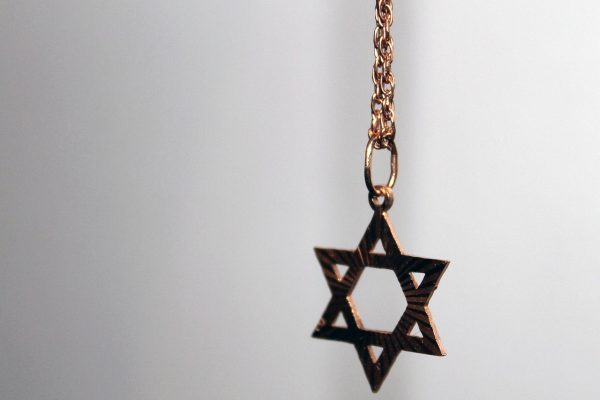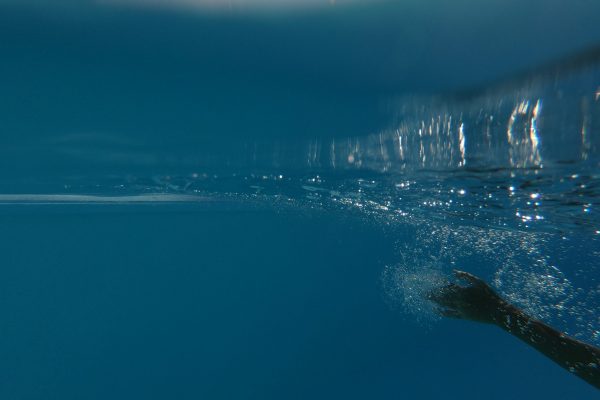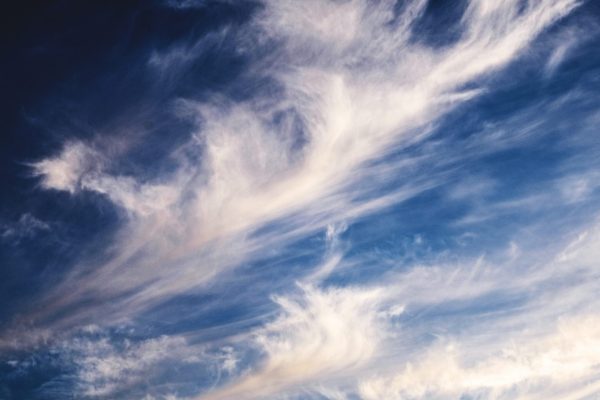The word “mikvehThe ritual bath. The waters of the mikveh symbolically purify – they are seen as waters of rebirth. A convert immerses in the mikveh as part of conversion. Many Orthodox married women go to the mikveh following their period and before resuming sexual relations. Couples go to the mikveh before being married. Many, including some men, immerse before Yom Kippur; some go every Friday before Shabbat.” means “gathering of waters.” On the third day of creation, we read in the TorahThe Five Books of Moses, and the foundation of all of Jewish life and lore. The Torah is considered the heart and soul of the Jewish people, and study of the Torah is a high mitzvah. The Torah itself a scroll that is hand lettered on parchment, elaborately dressed and decorated, and stored in a decorative ark. It is chanted aloud on Mondays, Thursdays, and Shabbat, according to a yearly cycle. Sometimes "Torah" is used as a colloquial term for Jewish learning and narrative in general. that G*d said: יקוו המים – yikavu hamayim, “Let the waters be gathered together.” That gathering was called the Seas. According to Rashi, this first gathering of the waters was the Great Sea our ancestors knew—the Mediterranean.
We stand here today in recognition of our own gathered waters. Here in our own community we have our own part of the Great Sea that was our people’s first mikveh.
We stand here on this day as witnesses to this sacred place, that after these few moments together will be sacred no longer. We gathered here now undertake three tevilot, immersions, into the meaning of this mikveh: its history, its community, and its spirituality.
1st immersion: history
This place was created for the gathering of living waters that has made possible so many holy moments of transition: for those passing from one life stage to another, or transitioning from belonging to the nations of the world to belonging to the People IsraelLit. ''the one who struggles with God.'' Israel means many things. It is first used with reference to Jacob, whose name is changed to Israel (Genesis 32:29), the one who struggles with God. Jacob's children, the Jewish people, become B'nai Israel, the children of Israel. The name also refers to the land of Israel and the State of Israel., and for the purposes of taharat hamishpahah.
(Continue with a brief presentation of the important dates associated with the mikveh.)
This Portland Community Mikveh has truly been a mikveh for our entire community. This is something rare and precious: a mikveh open to all Jews who seek to find inspiration through fulfillment of the mitzvahLit. Commandment. It is traditionally held that there are 613 mitzvot (plural) in Judaism, both postive commandments (mandating actions) and negative commandments (prohibiting actions). Mitzvah has also become colloquially assumed to mean the idea of a “good deed." of tevilahThe act of immersion in the ritual bath (mikveh)., the mitzvah of immersion.
בָּרוּךְ אַתָּה ה’ מֶלֶךְ הָעוֹלָם אֲשֶׁר קִדְּשָׁנוּ בְּמִצְוֹתָיו וְצִוָּנוּ עַל הַטְּבִילָה
Barukh atah Adonay, melekh haolam asher kidshanu b’mitzvotav v’tzivanu al hat’vilah
We bless the Source of Life of the World for mitzvotLit. Commandment. It is traditionally held that there are 613 mitzvot (plural) in Judaism, both postive commandments (mandating actions) and negative commandments (prohibiting actions). Mitzvah has also become colloquially assumed to mean the idea of a “good deed." that make our lives holy, for this mitzvah of immersion
2nd immersion: community
This mikveh has not only existed as a service to generations of Jews in our observance of halakhah. This structure was also a special place for many years to its faithful caretakers and attendants. In these moments we remember all those who have cared for this sacred space, so that it was always available for us who needed it.
(Continue with a brief presentation giving names and available history of caretakers and attendants)
בָּרוּךְ אַתָּה ה’ מֶלֶךְ הָעוֹלָם אֲשֶׁר קִדְּשָׁנוּ בְּמִצְוֹתָיו וְצִוָּנוּ לַעֲסֹק בְּצָרְכֵי הַקְהִילָה
Barukh atah Adonay, melekh haolam asher kidshanu b’mitzvotav v’tzivanu la’asok b’tzorkhey hakehillah
We bless the Source of Life of the World for mitzvot that make our lives holy, for this mitzvah of occupying ourselves with the needs of our community
3rd immersion: spirituality
It is written that water existed before anything else. Water has always been a symbol of life, of sustenance, and of joy for our people. JacobLit. heel Jacob is the third patriarch, son of Isaac and Rebecca, and father to the twelve tribes of Israel. More than any of the other patriarchs, Jacob wrestles with God and evolves from a deceitful, deal-making young man to a mature, faithful partner to God. His Hebrew name is Yaakov. and RachelLavan's younger daughter and Jacob's beloved wife second wife (after he is initially tricked into marrying her older sister, Leah). Rachel grieves throughout her life that she is barren while Leah is so fertile. Ultimately, Rachel gives birth to Joseph and dies in childbirth with Benjamin. Rachel is remembered as compassionate (she is said to still weep for her children), and infertile women often invoke Rachel as a kind of intercessor and visit her tomb on the road to Bethlehem. met at a well; Miriam’s well followed us through the wilderness; Torah itself, we are taught, is water to us.
In the Torah, we learn that immersion in water offers us a powerful way to move from one place in life to another. Long ago, we passed through the waters of the Reed Sea to become the Jewish people; we immerse in water to prepare for a holy moment, or to recover from one.
The mikveh is a symbol of hope for the Jewish people; this gathering of waters that reminds us that we can always grow, we can always learn, and we can always change. The mikveh will be there for us when we are ready to transition from one state to another.
In this historic moment, as we close down this mikveh, we give thanks:
For our community and its leaders, who create and maintain our Jewish sacred spaces;
For this mikveh and all the lives that it has touched, inspired, and uplifted;
and for the blessing of real, operational Jewish unity that this mikveh inspired.
It is written:
מִקְוֵה יִשְׂרָאֵל י-ה, כָּל-עֹזְבֶיךָ יֵבֹשׁוּ; וְסוּרַי בָּאָרֶץ יִכָּתֵבוּ, כִּי עָזְבוּ מְקוֹר
מַיִם-חַיִּים אֶת י-ה
Mikveh Yisrael Adonay, kol ozveykha yevoshu v’suray ba’aretz yikateyvu, ki azvu m’kor.
Mayim Hayyim et Adonay
G*d is the Hope of Israel! All that forsake You shall dry up; they that depart from You shall be written in the earth, because they have forsaken the Source of living waters. (Jeremiah 17:13)
As we now close this mikveh, we affirm the abiding value of the mitzvah of mikveh. We will not forsake mikveh, the Source of our Living Waters. We will hold onto the hope of unity for which it stands.
all repeat three times:
הַדְרָן עַלְךָ וְהַדֶּרְךָ עַלָּן
Hadran aleykha v’hadeyr’kha alan
We will return to you and you return to us
The mezuzot are removed along with any sacred books and any posted blessings or other Hebrew words.












